- Home
- Robert Rankin
The Da-Da-De-Da-Da Code Page 2
The Da-Da-De-Da-Da Code Read online
Page 2
Jonny shifted his position and took up a kind of ‘praying in the direction of Mecca’ sort of posture. Removed his hands from his earholes, drummed them on his pillow.
Raised his head and shouted, ‘Do shut up!’
Arose from his bed and stamped his feet and shouted, ‘Go away!’
Chitchat went the farming lads. A lady in a straw hat bought some cheese.
Jonny yelled abuse at the ceiling, stalked to his bedroom door (a short stalk, as the room was not over-large), threw open his bedroom door, stalked onto the landing, snatched up the rod with the hook on the end that opened the loft hatch, opened the loft hatch with it, ducked aside as the loft ladder crashed down (as it always did), took a deep breath and shimmied up the ladder.
Jonny stuck his head up through the loft hatch and shouted at …
Nothing.
There were no farmers in his loft, no stalls, no lady in a straw hat, no pies made from porker pigs. There were dusty boxes, a bicycle frame, some kind of telescopic clothes-drying jobbie, some unlaid rolls of loft insulation.
Jonny took another deep breath, coughed from the dust, slunk back down the ladder and returned to his bedroom and his bed.
Of course there was no farmers’ market up in his loft. Of course there had never been a farmers’ market up in his loft. Would never be a farmers’ market up in his loft. He was having one of his ‘episodes’ again because, as his mother told her chums at the bingo, Jonny, her one and only son, was not very well in the head.
‘No farmers’ market,’ said Jonny Hooker. ‘Never was, isn’t now, never will be!’
‘Somewhere over the rainbow,’ said Mr Giggles the Monkey Boy, ‘bluebells fly. Or so I have been unreliably informed.’
‘And there is no Mister Giggles the Monkey Boy,’ said Jonny, striking at his left temple with his left fist and covering his eyes with his right one.
‘No need to go all One Flew Over the Cuckold’s Nest on me,’ said Mr Giggles. ‘It’s not my fault that you’re not very well in the head.’
‘You do not exist,’ said Jonny. ‘You are a fragment of my mash-up mind.’
‘And me your dearest friend. Perhaps you mean a “figment”.’ Mr Giggles reached out a hairy hand and patted Jonny’s head with it.
‘And please do not do that.’ Jonny sat upon his bed wearing a very glum face.
‘Let’s go to the swimming baths,’ said Mr Giggles, ‘peep in the ladies’ changing rooms and spy their furry bottoms.’
‘I can’t swim,’ said Jonny. ‘And I’m not talking to you because you don’t exist. You are the product of my imagination. You are an imaginary friend.’
‘You know I don’t like that term,’ said Mr Giggles, a-twiddling his furry thumbs. ‘You know that I prefer to be known as an NCC – a non-corporeal companion.’
‘Whatever,’ said Jonny. ‘But you still don’t exist.’
‘If I don’t exist,’ said Mr Giggles, ‘how come I can do this?’
Jonny ignored Mr Giggles.
‘And this, too.’
Jonny ignored Mr Giggles again.
‘And what about this?’
Jonny was prepared to ignore Mr Giggles once more but was distracted from so doing by the sounds of his mother beyond his bedroom door, tripping over the loft ladder and falling into the bathroom.
‘Well,’ said Jonny to Mr Giggles, ‘if you’re so real, you can prove it by taking the blame for that.’
Jonny looked up at Mr Giggles, but Mr Giggles had gone.
Jonny Hooker grumbled and mumbled and buried his face in his hands. He was truly sick of Mr Giggles. Mr Giggles had been Jonny’s imaginary childhood friend. Jonny had been something of a loner as a child. The other children hadn’t taken to him because he was a bit odd and not very well in the head. So Jonny had been grateful when Mr Giggles turned up in his bedroom one night. Mr Giggles said that he had run away from the circus. Mr Giggles wore a fez and a brightly coloured waistcoat. He had a suitcase full of treasure and he knew one hundred songs. Jonny got on very well with Mr Giggles.
The only problem was that when Jonny reached puberty, a time when imaginary friends say farewell and vanish away for ever to make way for actual friends, generally of the opposite sex, Mr Giggles had refused to depart. He liked Jonny far too much, he told Jonny, and as Jonny didn’t appear to be making many other friends, he’d stay around for a little longer to keep him company.
And Jonny was now twenty-seven and Mr Giggles still hadn’t gone away. And the problem for Jonny was that Mr Giggles was just so real.
But then so was the farmers’ market. Although Jonny could only hear the farmers’ market. He couldn’t actually see the farmers. He could only see Mr Giggles.
In the past, when a lad, Jonny could see and hear all manner of things that others could not: noisy ghosts and bad witches, fairies and spacemen and dragons and pirates and all.
He could no longer see these things, but some of them he could still hear. And those he could hear tormented him.
He’d been through all the usual diagnostics. He’d been prescribed, and had taken, all the usual antidepressants and uppers and downers and so forth.
Chlorpromazine, clozapine, haloperidol and risperidone. Pimozide, which had worked a treat on his Tourette syndrome.
Then there were all the old favourites: methylphenidate (Ritalin), lithium (priadel), anticonvulsant drugs, carbamazepine (Tegretol), valproate semi-sodium (Depakote), gabapentin (Neurontin) and lamotrigine (Lamictal), antidepressants (such as bupropion (Wellbutrin) or sertraline (Zoloft)), neuroleptics e.g. haloperidol (Haldol) and benzodiazepines e.g. lorazepam (Ativan).
And aspirin, for when he had a headache.
And Jonny had learned, through bitter experience, what to say during counselling sessions in order to remain ‘at liberty’.
Jonny sighed and ground his teeth and listened to the sounds of his mother floundering around on the bathroom floor. She had clearly fallen belly-up, and, tortoise-like, was quite incapable of righting herself.
‘Jonny,’ wailed his mother.
And Jonny went to help.
Having reconfigured his mother into the vertical plane, Jonny dusted her down, straightened the hem of her Paisley housecoat, which had ridden up above her surgical stockings, and sought her upper set of false teeth, which had gone adrift in the tumbling. He located these behind the toilet, took them to the sink, rinsed them under the tap and returned them to his mother. The old one slotted the artificial railings over her sunken gums, thanked her son and asked, in as polite a manner as she considered it merited, whether it had indeed, as she suspected, been his intention to have her murdered to death by leaving the loft ladder in the down position when he was well aware that she could not see it due to a sight defect she had acquired (whilst riding to hounds with the Berkshire Hunt) that had severed the optical nerve that allowed people to see ladders.
‘It wasn’t me,’ Jonny suggested.
‘Was it Mister Giggles?’ his mother enquired.
‘It was me,’ said Jonny. ‘I’m sorry, Mum.’
‘You’re a good boy, Jonny,’ said his mother. ‘Even if you do try to kill me dead upon every occasion that arises. I came up here to bring you a cup of tea and a letter that has your name upon it. The tea went down the toilet; the letter, I think, went out of the window.’
Jonny glanced into the toilet. There, half-submerged, was his favourite mug. The one with ‘THE WORLD’S GREATEST SON’ printed upon it.
‘Out of the window?’ said Jonny, glancing now in that direction.
‘Flew like a bird from my hand.’
Jonny lowered the toilet lid and then lowered his mother onto it. ‘I’ll pop down to the garden and see if I can find the letter,’ he told her.
And that is what he did.
Jonny did not exactly bounce down the stairs. Although there was a very slight spring in his step. A letter addressed to him? This was something new, something different. Perhaps his luck was about to change. Pe
rhaps some half-forgotten uncle had died and left him a fortune or something.
Jonny reached the foot of the stairs and paused.
What was he thinking? Optimistic thoughts?
What had put these into his head?
Why would he be thinking that something good was about to occur? How weird was that?
But Jonny did feel optimistic. Suddenly optimistic. He didn’t know why and he didn’t know how, but he did.
It was a very strange feeling.
Almost as if there was something fateful about this letter.
Something life-changing.
In the back garden Jonny found the letter.
It was floating on the ornamental pond.
3
As Jonny fished the letter from the ornamental pond, he noticed something very strange about the garden.
It was very, very quiet.
It had never been a noisy garden, but there was always some noise to it, some ambient sounds, as it were.
Traffic rumblings, a neighbour’s radio.
Birds a-twitter, washing swinging to and fro.
Scurrying of beetles.
Bells in distant steeples.*
And pretty maids all in a row. Ho ho.
But not today. Not at this particular moment.
Jonny paused in the shakings of wet from his letter. There was absolutely no sound. It was as if all sound, the very sound of the world itself, had been suddenly switched off. The power plug pulled from the socket, as it were. A great and terrible silence.
Jonny rooted a finger into his ear. It was a horrible silence. Jonny did not like this silence one bit. Jonny shook his head about.
‘It’s quiet, ain’t it?’ said Mr Giggles. ‘Is that letter for me?’
‘It’s not for you, it’s—’ And ‘ouch’ went Jonny as all the sounds in the world came rushing back.
‘What was that? What was that?’
‘That, my friend, was a pregnant pause,’ said Mr Giggles. ‘Something significant is about to occur.’
‘In this garden?’
Mr Giggles shook his furry head. ‘I very much doubt that,’ he said. ‘I can’t imagine a dullard like yourself ever doing anything significant, can you?’
Jonny ignored Mr Giggles once more and addressed himself to the address upon the envelope that he now held in his hand. It was his address. And above it was his name – Jonathan Hooker, Esq.
‘Open it up, then,’ said Mr Giggles.
‘I’m ignoring you,’ said Jonny. ‘I’m not talking to you.’
‘Fair enough,’ said Mr Giggles, tilting his fez to the angle known and loved as ‘rakish’. ‘So open up the envelope and let’s have a look at the letter.’
‘Whatever it is, it is none of your business.’
‘Well, obviously not, as I clearly do not exist.’
Jonathan Hooker opened the envelope. As the envelope was soggy, he made quite a mess of this and managed to tear the letter within and generally spoil things. Generally. With difficulty he withdrew, unfolded and read the letter.
Dear Mr Hooker (he read)
Your name has been selected by
our Competition Supercomputer to be a
WINNER WINNER WINNER
If you wish to claim your prize,
Please present yourself to—
‘Blah blah blah blah,’ went Jonny.
‘Present yourself to where?’ said Mr Giggles.
‘Blah blah blah blah,’ said Jonny. ‘That’s what it says here. If I was going to tell you, which I’m not.’
‘Naturally,’ said Mr Giggles. ‘Give us a butcher’s at the letter.’
Jonny gave Mr Giggles a butcher’s.
Mr Giggles read from the letter. ‘It’s not “blah blah blah blah,”,’ he said, ‘it’s “da-da-de-da-da!”’
‘And what is that supposed to mean?’
‘It means what it is,’ said Mr Giggles. ‘It’s musical. You’re a musician – you know what it means.’
‘As in the way that most tunes go “da-da-de-da-da”?’
‘Exactly. Like “Walltzing Matilda” – the tune of each verse goes “Da-da-de-da-da. Da-da-de-da-da. Who’ll come a-Waltzing Matilda with me?”’
‘So what does this letter mean?’
‘Why are you asking me? I don’t exist, remember?’
Jonny checked his wristlet watch. He had forgotten to wind it the night before, and it had stopped.
‘What time is it?’ he asked Mr Giggles.
The Monkey Boy consulted a rather decorative chronometer that he drew from the pocket of his colourful waistcoat. ‘Ten-thirty of the morning clock,’ said he. ‘Sun over the yardarm, time for a pint of wallop.’
‘Ten-thirty,’ said Jonny. ‘Fair enough, I give up.’
‘You always do. I don’t know why you go to all the trouble. Every day you try to persuade yourself – and also myself – that I do not exist.’
‘And every day I give up at ten-thirty,’ said Jonny.
‘It’s best to.’ Mr Giggles smiled upon Jonny. ‘Why don’t we go down to the pub and try to fathom the meaning of your most peculiar missive?’
‘Will you be getting the first round in?’
Mr Giggles raised a hirsute brow upon his hirsute forehead. ‘You say that every single day,’ said he. ‘Which curiously I find strangely comforting.’
Mr Giggles followed Jonny through the garden gate.
Upstairs, in the bathroom, Jonny’s mother, who had slipped from the toilet lid, floundered once more upon her back making sounds that oddly resembled those of a seagull.
The pub was called The Middle Man. It stood in Pope’s Lane, one hundred yards before the northern entrance to Gunnersbury Park. It had been standing there for more than one hundred years and no one so far had told it to move.
Within the pub and standing behind the bar counter stood O’Fagin the publican. He had been standing there for five minutes. His wife had told him to move three times already this morning. O’Fagin felt certain deep down in his bones that she was sure to ask him to do so again.
But O’Fagin was just like the rest of us when it came to his abilities regarding accurate prediction of the future. His wife would never again ask him to move, because later in the day she would run off with a sales rep who travelled in tobaccos and had only entered the pub with the intention of introducing its incumbents to a new brand of cigarettes known as Dadarillos.
Sometimes love, it seems, conquers all.
At other times, who can say?
‘I say good morning to you both,’ said O’Fagin the publican.
‘To myself and Mister Giggles?’ Jonny Hooker enquired.
‘Sun’s over the yardarm and all is right in God’s Heaven,’ said O’Fagin. ‘And although I can’t actually see or hear Mister Giggles and only know of his supposed existence because every time you’re really pissed, you blather on and on about how he’s your bestest friend.’
Jonny Hooker groaned.
‘But anyway,’ continued O’Fagin, ‘I had an imaginary friend myself when I was a kid.’
‘I know,’ said Jonny. ‘I went to school with you. And I was the friend that you had.’
‘I’ve never quite understood that,’ said O’Fagin, ‘because, clearly, I’m much older than you. I’ll ask my wife about it later. She knows all kinds of things. She went to boarding school and can impersonate ponies and everything.’
‘Good morning, barlord,’ said a well-clad fellow who had but lately entered the bar. ‘I would like to take this opportunity to introduce you to a new brand of cigarette.’
‘Would you mind introducing my wife to it?’ said O’Fagin. ‘She’s through that door over there.’
‘Fair enough,’ said the fellow. And with that he was gone.
‘Nice chap by the sound of him,’ said O’Fagin to Jonny. ‘But then what do I know?’
‘You know how to draw a pint,’ said Jonny, miming the pulling of one. ‘Best stick with what you know, I suppose.’
O’Fagin applied himself to the pump handle and drew off a pint of King Billy. He presented this to Jonny and said, ‘And what is Mister Giggles having, then?’
‘Mister Giggles is buying his own.’
‘Cheap shot,’ said Mr Giggles. ‘A tot of rum and a bag of nuts will see me fine.’
‘A bag of nuts,’ said Jonny.
‘Dry-roasted, honey-roasted, salted, plain or fancy?’
‘Fancy nuts?’ said Jonny.
‘Not really,’ said O’Fagin. ‘I prefer crisps.’
The sun went behind a cloud and a dog howled in the distance.
‘Which reminds me,’ said O’Fagin. ‘did you hear that really big silence earlier?’
‘You heard that, too?’ Jonny asked. ‘Or failed to hear everything else.’
‘Quite so. It fair put the wind up me. I was just about to open a letter and my wife was just about to tell me to move, when the world went silent. I thought my hearing aid had packed up.’
‘But you don’t wear a hearing aid.’
‘Of course I don’t. Do I look like a homosexual?’
‘Not in the slightest.’
‘So how do they look? In case one comes in here and I don’t recognise him.’
‘You’re confusing me,’ said Jonny.
‘Confusing you with whom?’
‘Search me,’ said Jonny.
‘Why – are you hiding something?’
The clock chimed behind the bar and a dog howled in the distance.
‘I must get that dog fixed,’ said O’Fagin. ‘Now, what were we talking about?’
‘Silence,’ said Jonny.
‘But I thought you enjoyed my conversation.’
‘You said that the world went silent when you were about to open an envelope.’
‘So I did,’ said O’Fagin. ‘What a coincidence.’
‘Do you have the letter? Might I have a look at it?’
‘I do and you might. Have you decided yet upon what variety of nuts you’d like to purchase? Only I get a bit anxious if things are left hanging in the air.’
Jonny said nothing.
A moment passed.
‘I was hoping you’d ask me, “What kind of things?”’ said O’Fagin. ‘I have quite a list. You’d be surprised by some of the items on it.’

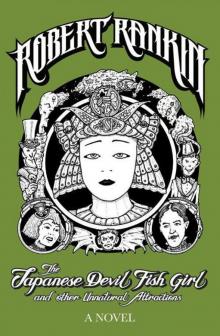 The Japanese Devil Fish Girl and Other Unnatural Attractions
The Japanese Devil Fish Girl and Other Unnatural Attractions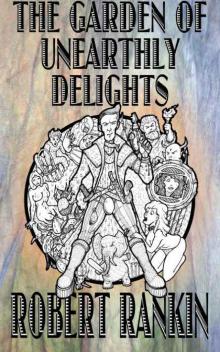 The Garden of Unearthly Delights
The Garden of Unearthly Delights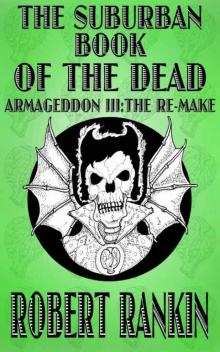 The Suburban Book of the Dead: Armageddon III: The Remake
The Suburban Book of the Dead: Armageddon III: The Remake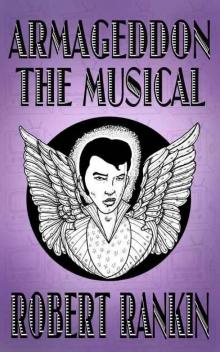 Armageddon_The Musical (Armageddon Trilogy Book 1)
Armageddon_The Musical (Armageddon Trilogy Book 1)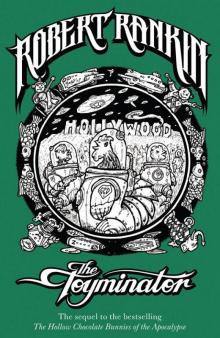 The Toyminator
The Toyminator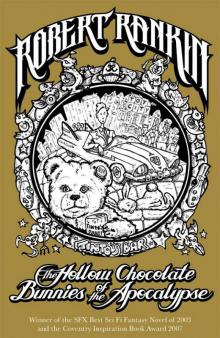 The Hollow Chocolate Bunnies of the Apocalypse
The Hollow Chocolate Bunnies of the Apocalypse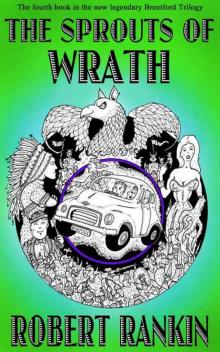 The Sprouts of Wrath
The Sprouts of Wrath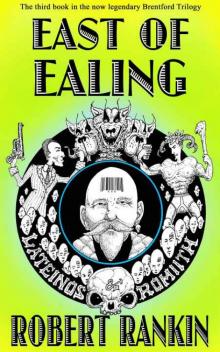 East of Ealing
East of Ealing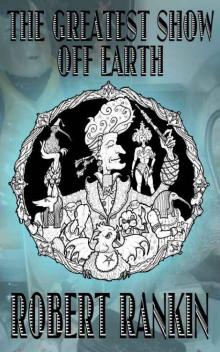 The Greatest Show Off Earth
The Greatest Show Off Earth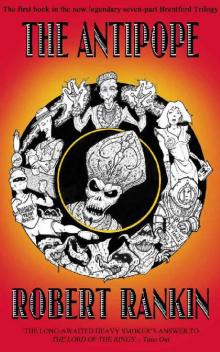 The Antipope
The Antipope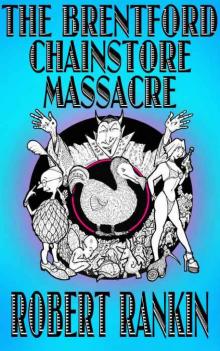 The Brentford Chainstore Massacre
The Brentford Chainstore Massacre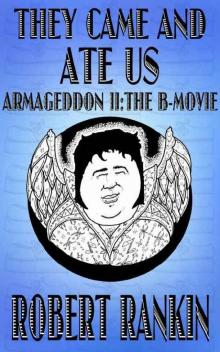 They Came and Ate Us_The B-Movie (Armageddon Trilogy 2)
They Came and Ate Us_The B-Movie (Armageddon Trilogy 2)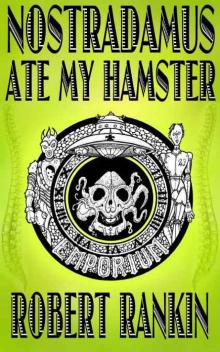 Nostradamus Ate My Hamster
Nostradamus Ate My Hamster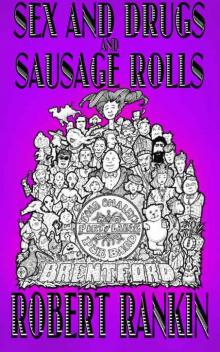 Sex and Drugs and Sausage Rolls
Sex and Drugs and Sausage Rolls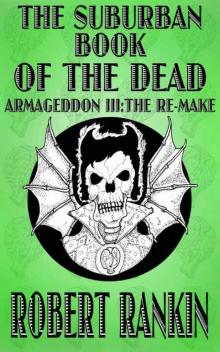 The Suburban Book of the Dead_The Remake (Armageddon Trilogy 3)
The Suburban Book of the Dead_The Remake (Armageddon Trilogy 3)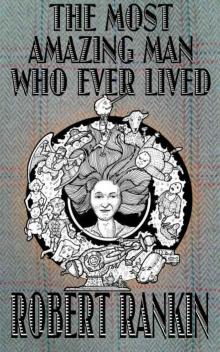 The Most Amazing Man Who Ever Lived
The Most Amazing Man Who Ever Lived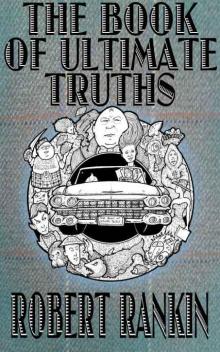 The Book of Ultimate Truths
The Book of Ultimate Truths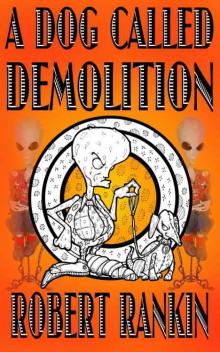 A Dog Called Demolition
A Dog Called Demolition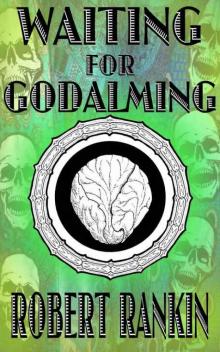 Waiting for Godalming
Waiting for Godalming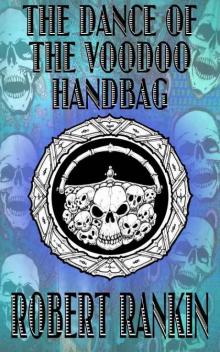 The Dance of the Voodoo Handbag
The Dance of the Voodoo Handbag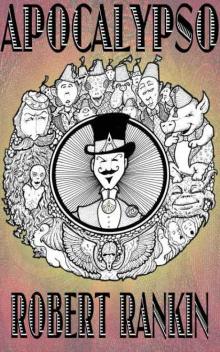 Apocalypso
Apocalypso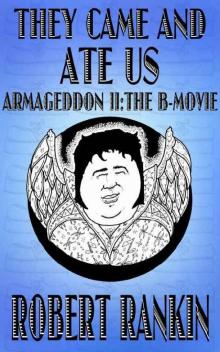 They Came and Ate Us: Armageddon II: The B-Movie
They Came and Ate Us: Armageddon II: The B-Movie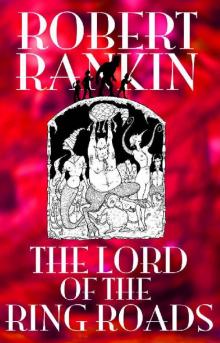 The Lord of the Ring Roads
The Lord of the Ring Roads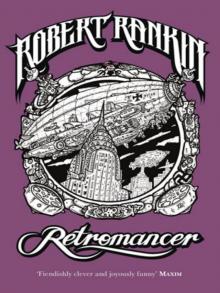 Retromancer
Retromancer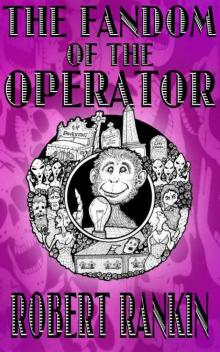 The Fandom of the Operator
The Fandom of the Operator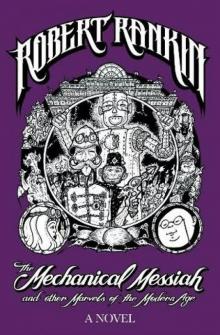 The Mechanical Messiah and Other Marvels of the Modern Age
The Mechanical Messiah and Other Marvels of the Modern Age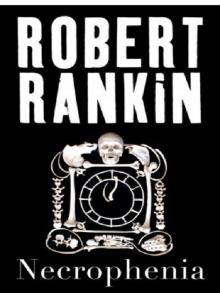 Necrophenia
Necrophenia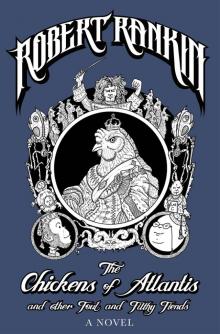 The Chickens of Atlantis and Other Foul and Filthy Fiends
The Chickens of Atlantis and Other Foul and Filthy Fiends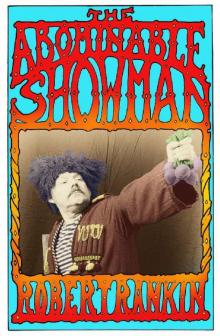 The Abominable Showman
The Abominable Showman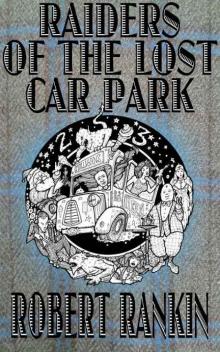 Raiders of the Lost Carpark
Raiders of the Lost Carpark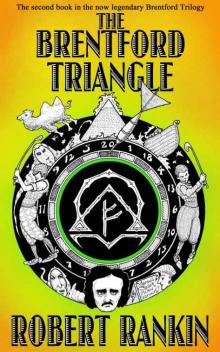 The Brentford Triangle
The Brentford Triangle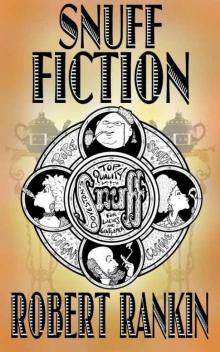 Snuff Fiction
Snuff Fiction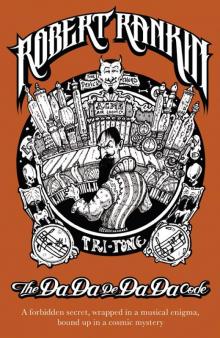 The Da-Da-De-Da-Da Code
The Da-Da-De-Da-Da Code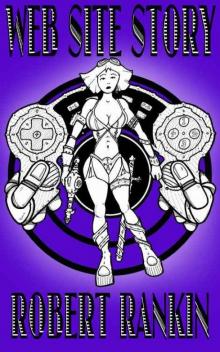 Web Site Story
Web Site Story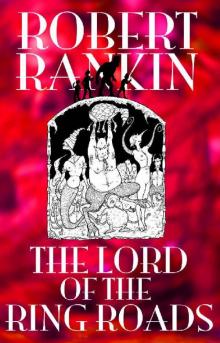 The Lord of the Ring Roads (The Final Brentford Trilogy Book 1)
The Lord of the Ring Roads (The Final Brentford Trilogy Book 1)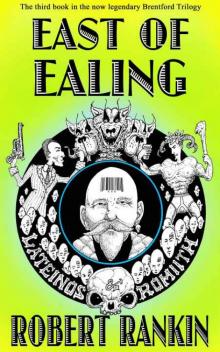 East of Ealing (The Brentford Trilogy Book 3)
East of Ealing (The Brentford Trilogy Book 3)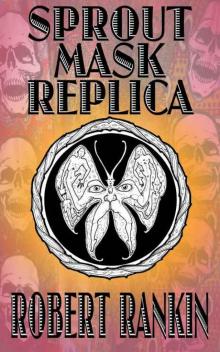 Sprout Mask Replica (Completely Barking Mad Trilogy Book 1)
Sprout Mask Replica (Completely Barking Mad Trilogy Book 1)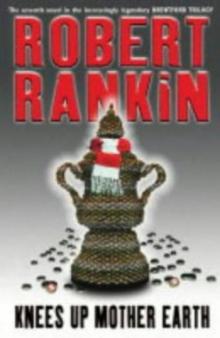 Knees Up Mother Earth bs-7
Knees Up Mother Earth bs-7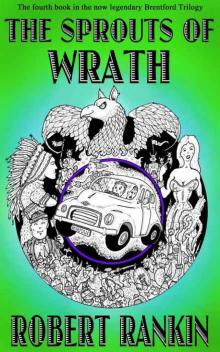 The Sprouts of Wrath (The Brentford Trilogy Book 4)
The Sprouts of Wrath (The Brentford Trilogy Book 4)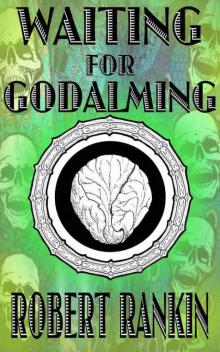 Waiting for Godalming (Completely Barking Mad Trilogy Book 3)
Waiting for Godalming (Completely Barking Mad Trilogy Book 3)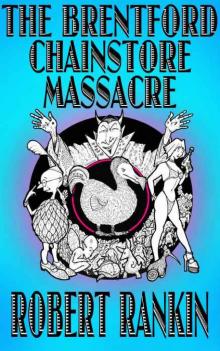 The Brentford Chainstore Massacre (The Brentford Trilogy Book 5)
The Brentford Chainstore Massacre (The Brentford Trilogy Book 5)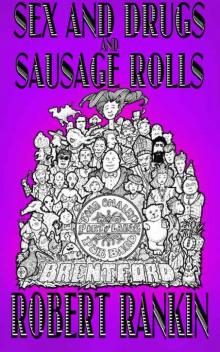 Sex and Drugs and Sausage Rolls (The Brentford Trilogy Book 6)
Sex and Drugs and Sausage Rolls (The Brentford Trilogy Book 6)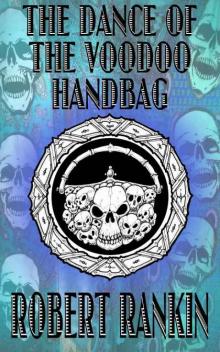 The Dance of the Voodoo Handbag (Completely Barking Mad Trilogy Book 2)
The Dance of the Voodoo Handbag (Completely Barking Mad Trilogy Book 2)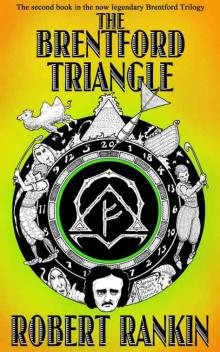 The Brentford Triangle (The Brentford Trilogy Book 2)
The Brentford Triangle (The Brentford Trilogy Book 2)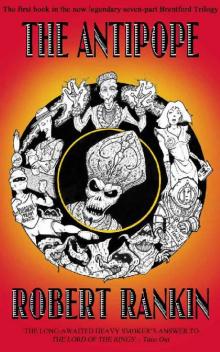 The Antipope (The Brentford Trilogy Book 1)
The Antipope (The Brentford Trilogy Book 1)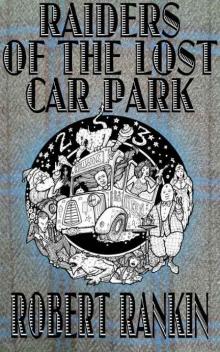 Raiders of the Lost Car Park (The Cornelius Murphy Trilogy Book 2)
Raiders of the Lost Car Park (The Cornelius Murphy Trilogy Book 2)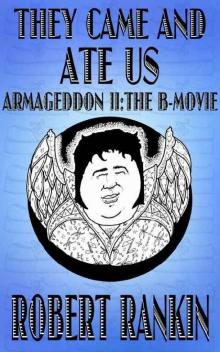 They Came and Ate Us - Armageddon II_The B-Movie (Armageddon Trilogy Book 2)
They Came and Ate Us - Armageddon II_The B-Movie (Armageddon Trilogy Book 2)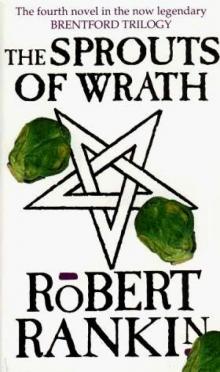 The Sprouts of Wrath bs-4
The Sprouts of Wrath bs-4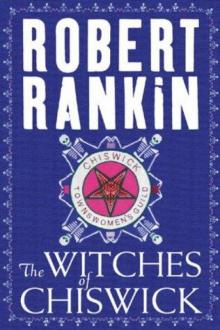 The Witches of Chiswick
The Witches of Chiswick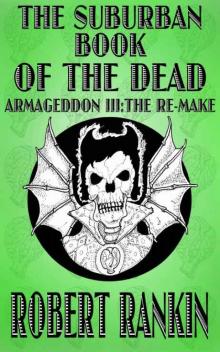 The Suburban Book of the Dead - Armageddon III: The Remake (Armageddon Trilogy 3)
The Suburban Book of the Dead - Armageddon III: The Remake (Armageddon Trilogy 3)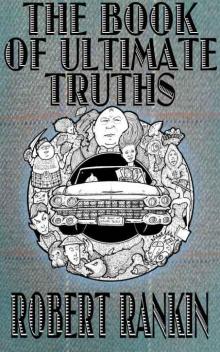 The Book of Ultimate Truths (The Cornelius Murphy Trilogy 1)
The Book of Ultimate Truths (The Cornelius Murphy Trilogy 1)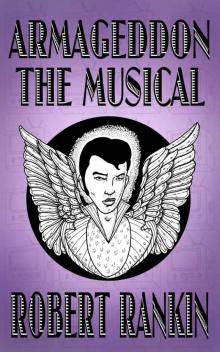 Armageddon: The Musical (Armageddon Trilogy)
Armageddon: The Musical (Armageddon Trilogy)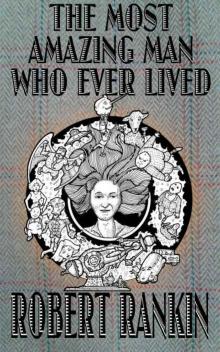 The Most Amazing Man Who Ever Lived (The Cornelius Murphy Trilogy Book 3)
The Most Amazing Man Who Ever Lived (The Cornelius Murphy Trilogy Book 3)